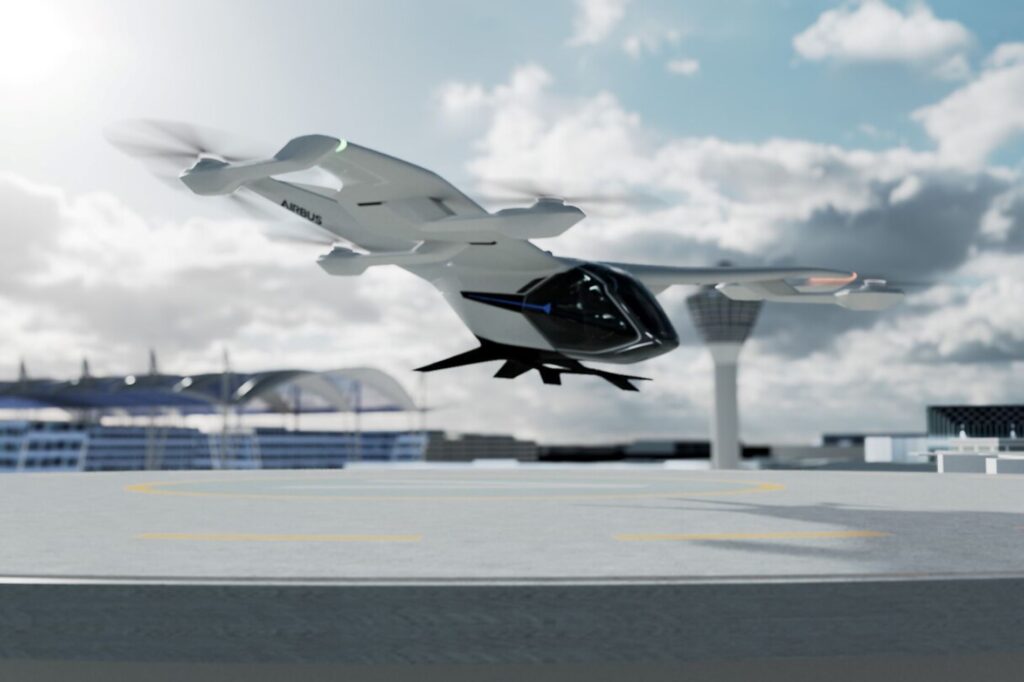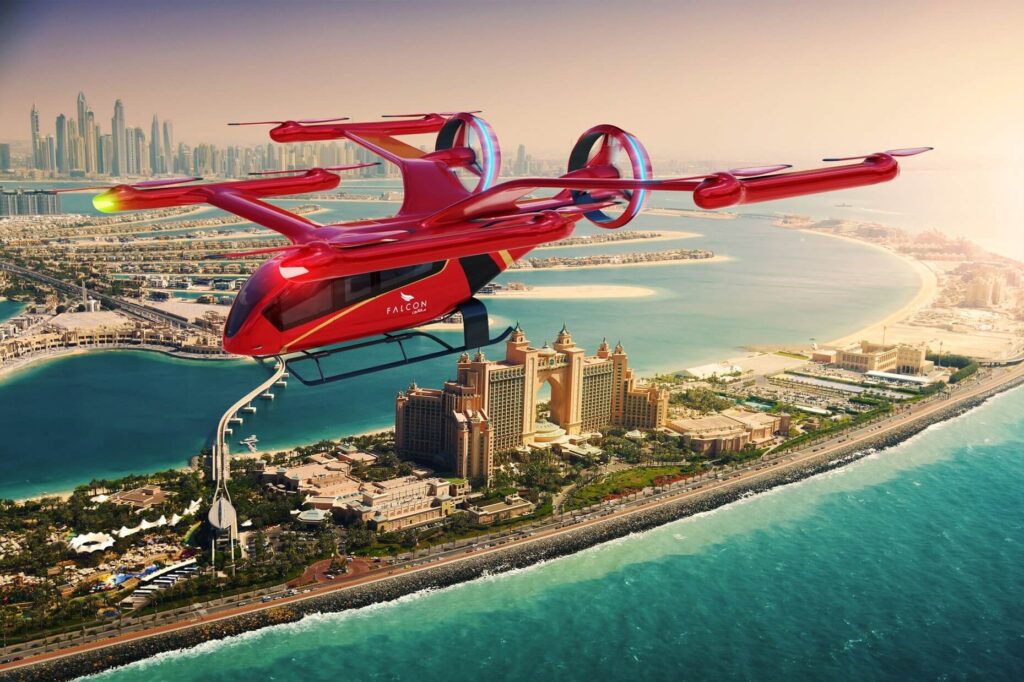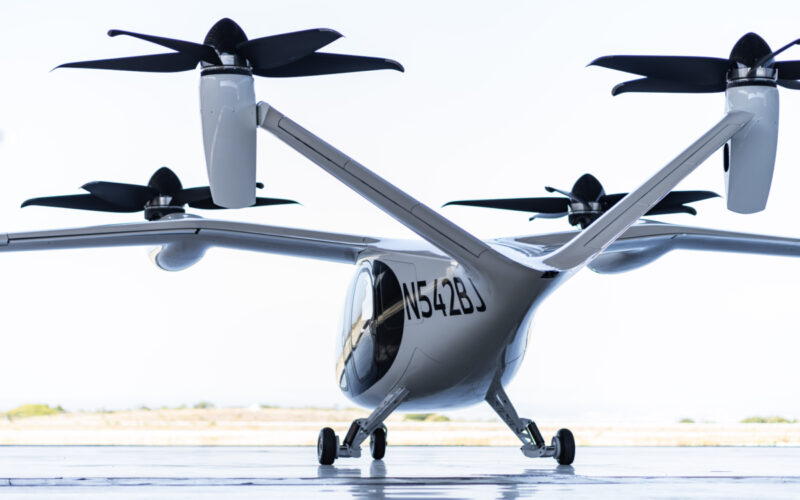If all goes to plan, 2025 will be the year that the aviation industry takes a huge leap forward into uncharted skies and launches the first commercial eVTOL flights.
Years of dedication, sleepless nights and dreams of future flight, aircraft manufacturers will capture the attention of the world with silent aircraft featuring novel aircraft configurations that perform inter- and intra-city operations – those that have been historically inaccessible to the public.
In which city this seismic event will happen is still not certain, as no one yet can be sure which airline or aviation disrupter will reach the finish line first.
A strong contender is undoubtedly the collaboration between United Airlines and eVTOL developer Archer Aviation.
On March 23, 2023, the pair announced their plans to launch a regular air connection between Chicago O’Hare (ORD), the city’s main international airport, and Vertiport Chicago, in the heart of the city’s business area.
While in the United Kingdom Vertical Aerospace is leading the field after the Civil Aviation Authority (CAA) granted the company the first electric vertical take-off and landing Design Organization Approval (DOA).
This allows Vertical Aerospace to continue to progress with the certification of the VX4 eVTOL aircraft, which will undoubtably please its list of waiting customers that include American Airlines, Virgin Atlantic, Japan Airlines and GOL.
Demand for pilots

Already today, pilots are in high demand with airlines across the globe competing to entice new recruits over to their carrier.
Around a quarter of a million more fixed-wing pilots will be needed for the civilian space by 2030.
A burgeoning new aviation industry that requires qualified pilots could therefore be seen as bad timing.
However, if the dreams of flying commercial eVTOL flights are going to bear fruit then operators will need to source the right pilots.
Who will pilot the first eVTOL flights?

The eVTOL industry’s first pilots will be placed under the microscope, requiring nerves of steel, not only to fly the very first passengers but to do all of this under the media spotlight.
So where will these top gun pilots come from? And how will the airline industry ensure that they are the right people for the job?
AeroTime spoke with Advanced Air Mobility Strategy, Business Development and Partnerships Leader, Stella Hughes, at CAE, a global aviation company specializing in pilot training, to gain an understanding of who the first eVTOL pilots will be.
“The Federal Aviation Authority (FAA) have been very clear that the first pilots operating eVTOLSwill be those with commercial pilot licenses (CPL) that will undergo a transition course. Under EASA, eVTOL pilots will either hold an airplane CPL or a helicopter CPL, and will then add a eVTOL-specific type rating,” Hughes explained. “They’re not going to come from an ab initio background from day one. In the near term, regulators will require that eVTOL pilots meet the same hour requirements as operators today.”
She added: “Beyond that, the operators themselves want the most experienced people, because these will be single pilots operating high visibility routes into the middle of a city center.”
Airlines will therefore draw on their most highly skilled existing pilots, their “top-gun pilots,” to take the project forward with safety being the most important consideration.
“Many of the airlines taking these aircraft are already planning for pilots within that airline that know the airline’s culture of safety to be the first eVTOL operators, as the airline proves out early routes. The product that airlines deliver is safety, so these are going to be your flight test pilots and leading pilots .”
It is not only the temperament of the experienced pilot that is so attractive for flying eVTOL but also their decision making skills. Pilots will be navigating environments they are unfamiliar with and perhaps more in common with the skillset required of those flying helicopters. “The pilots will be operating in urban canyons, with microweather and updraft around buildings. They’ll have to manage communication dead zones; where you don’t have constant interaction with air traffic control. And in 2030, there will be numerous vehicles flying in condensed air traffic corridors, so pilots will have to interact with each other and make rapid decisions in dense air space should one vehicle’s mission not go as planned. And it’s a single pilot that needs to do all this,” Hughes explained.
Which airline will fly eVTOLs first?
According to Hughes there are currently 36 traditional companies with Aircraft Operator’s Certificate (AOC) that have placed orders for eVTOL aircraft.
“They’re at various levels of maturity because some operators have made the decision on an executive level to add eVTOLs to the fleet, but are waiting for the aircraft programs to advance before dedicated planning. And then you have other airlines with a dedicated team that is advanced in operational planning and working with local stakeholders,” Hughes explained.
Hughes highlighted Brazilian airline GOL as a carrier that is making big strides forward to be ready for 2025.
“GOL is very forward thinking. They already workshopping their AAM processes and connecting with air traffic control in Sao Paulo. Some airlines are already thinking ‘what is on our to do list? If we’re going to be operational for 2025,we need to start checking it off.’ And the industry is getting to a point where workforce is becoming a critical-path “to-do” item”
Stella Hughes from CAE will be speaking at Revolution.Aero, a unique gathering of people who are leading the future of flight, as part of a two-day event running from Tuesday, April 25 to Wednesday, April 26, 2023.

